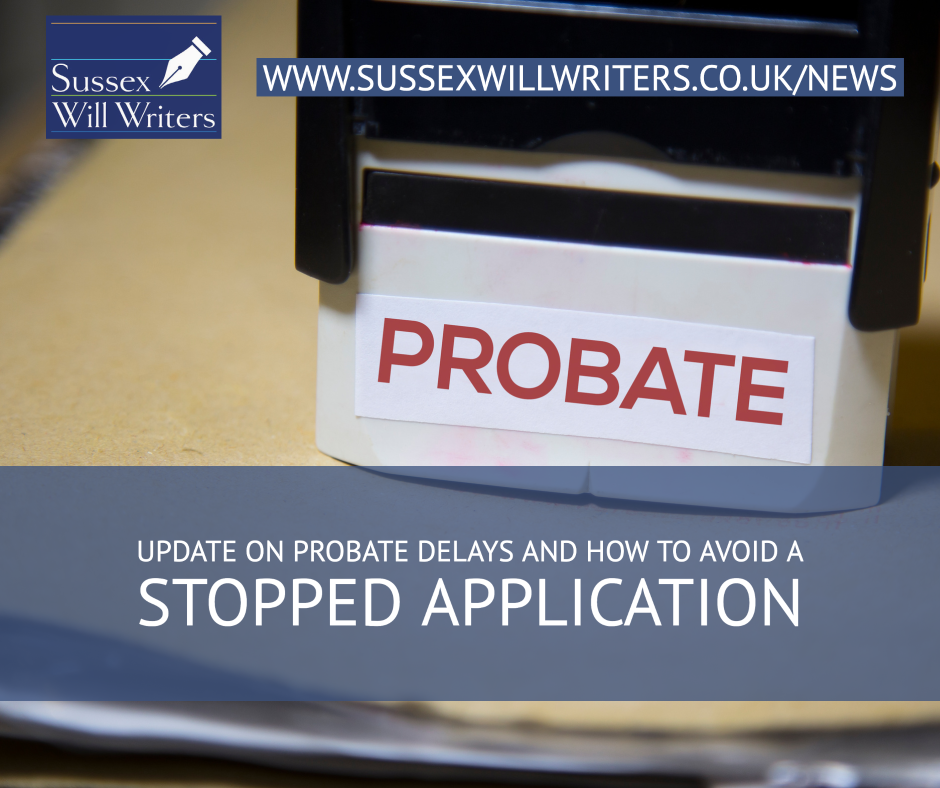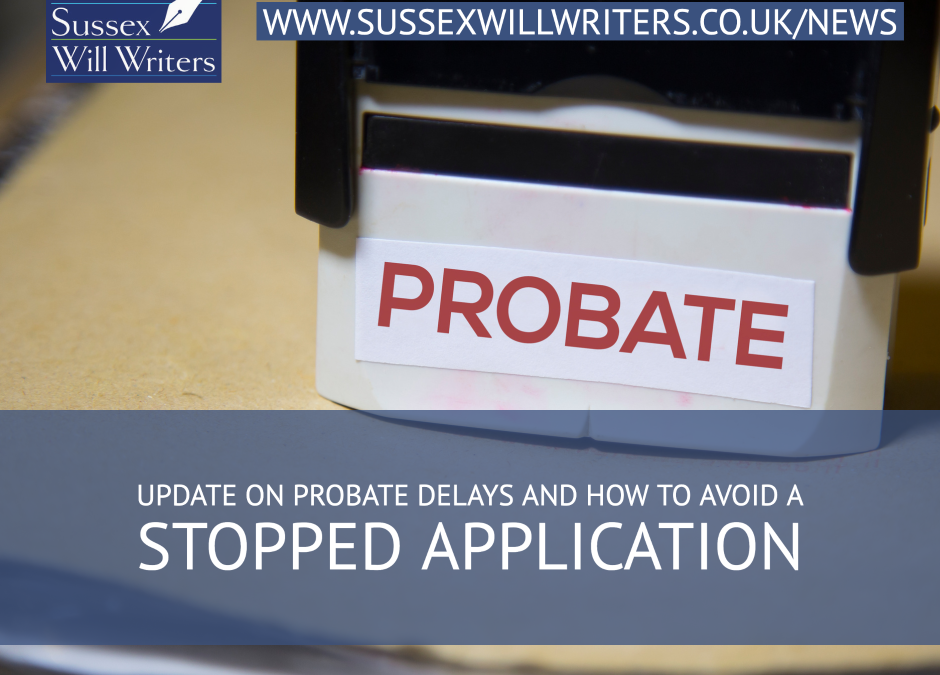
From: Kings Court Trust
Bereaved families and estate administrators across England and Wales continue to face delays when applying for a Grant of Representation – the umbrella term for Grant of Probate (when there is a Will) and Letters of Administration (when there is no Will).
The Ministry of Justice has recently released the Family Court Statistics Quarterly: January to March 2023 publication. According to the report:
- During the January to March 2023 period, Grants of Probate took approximately 9 weeks, Letters of Administration (no Will) took approximately 14 weeks, and Letters of Administration with Wills annexed took approximately 25 weeks (from submitting an application to Grant received).
- 82,871 applications were made for Grants of Representation – 69,208 (84%) were for Grants of Probate; 50,318 Grants of Probate were issued in the same period.
- 89% of Grant of Probate applications and 90% of Grants issued were applied for digitally.
- 63% of Grants issued were applied for by legal professionals and 37% were personal applications.
- Grants that were ‘stopped’ during this period took an average of 20 weeks to be issued. More information regarding stopped applications can be found in this blog.
HM Courts & Tribunals Service (HMCTS) has provided more recent figures for April, revealing that the average timeline for a Grant of Probate was 15.5 weeks – nearly double the 7.9 week timeline that was seen in July 2022. This has continued into May as applications have taken an average of 15.4 weeks.
Previous guidance on GOV.UK stated the average timeframe for a Grant was 8 weeks. However, this now states that Grants of Representation can take up to 16 weeks once an application has been submitted. It also states that delays can be experienced if additional information is required. It’s important to highlight that these timeframes are applicable once a Grant application has been processed by the Probate Registry; unfortunately, weeks can pass before paperwork is initially reviewed for the first time. Although digital applications prove to be quicker than paper applications, the paperwork and information required are the same – therefore, there is no clear explanation for why one method produces a quicker result than the other.
The HMCTS management information statistical data sets share data from the June–May period across the previous three years. It states the number of applications and Grants issued, providing insight into the number of outstanding applications.
| June 2020–May 2021 | June 2021–May 2022 | June 2022–May 2023 | |
| Applications received | 296,331 | 277,719 | 299,852 |
| Grants issued | 275,278 | 271,205 | 258,975 |
| Deficit (number of applications received minus Grants issued) | 21,053 | 6,514 | 40,877 |
According to the data, June 2022–May 2023 has seen the highest deficit (40,877 outstanding applications) in comparison to the previous two years. Across the three years, the number of applications received outweighs the number of Grants issued. Although this figure has fluctuated, it causes concern about when the backlog will be cleared. In total, there were 68,444 outstanding applications from June 2020–May 2023; it is also believed there was a backlog before June 2020.
In an attempt to clear the backlog and keep up with demand, HMCTS announced the recruitment of 100 new staff in Q2 of 2023; this results in a 30-40% increase in resource at the Probate Registry. Training has been carried out to get the new staff up to speed.
Kings Court Trust’s Chief Executive Officer, Simon Hancox, commented:
In April/May this year, we welcomed the news that resource at the Probate Registry was to be increased by an estimated 30-40%, but we are still affected by the Probate Registry’s continued underperformance in July. As a business, our biggest concern remains that we continue to make more applications than Grants received every month. We understand that the increase in resource isn’t going to be productive straight away. However, we also recognise that our business and the Probate Registry will soon be heading into the busiest period of the year; if they cannot get to a point of issuing more Grants than applications received soon, we’ll have to assume that things will only get worse. Going by the current timeframes and available data, it could take approximately two years before the backlog is cleared and the Registry is in a significantly better position.
We last met with HMCTS in June this year. During this meeting, they were unable to state the number of outstanding applications – although their data suggests this sits in excess of 50,000. From our own experience, 25% of our outstanding applications at the Registry are over 16 weeks old, with an average age of 9 months. Surprisingly, and frustratingly, we are getting some Grants back within a month. Whilst this is great news for some clients, it identifies that there is no logic behind what is being prioritised and issued. Our preference is for older Grant applications to be processed as a priority.
As a business, and we assume as a sector, this has a major impact on our clients, our operational service delivery, and the management of cash flows. Unfortunately, we believe that all providers are experiencing the same disappointing service.
What are the most common causes for stopped Grant applications?
There are some common causes for stopped applications. A blog by MyHMCTS, the online case management tool managed by HMCTS for legal professionals, states that stopped applications can double the time taken to issue a Grant. According to the blog, stopped applications are commonly caused by:
- Missing documents. Delays to Grant applications are caused when the required supporting documents are not submitted at the same time as the application. Power of Attorney and Inheritance Tax forms are reported as common missing documentation.
- Missing Inheritance Tax (IHT) information. As IHT is administered by HMRC, it takes approximately 20 days for form IHT421 (if applicable) to reach HMCTS to process an application. If a probate application is received before this, the application will be delayed.
- Missing Executors. Applications must include all the Executors of an estate, and it is a requirement to disclose why an Executor is not applying. For example, disclosing that an Executor has predeceased.
- Queries about the Will’s condition. To mitigate the risk of fraud, staple holes, rips, missing pages, or stains may be queried.
What happens when a Grant application has been stopped?
If a Grant application comes to a halt for any of the reasons stated above, the application is submitted to an alternative queue until the required information or documentation has been submitted. If a legal practitioner is administering the estate, they will be alerted of the stopped application and will be informed of the requirement before it can be further processed.
What can be done to reduce the risk of a stopped Grant application?
There are various steps to consider that may help reduce the risk of a stopped Grant application. HMCTS suggests checking the following before applying for probate:
- If Inheritance Tax is payable, the IHT form has been submitted to HMRC 20 working days before applying for probate. As of 1 January 2022, the reporting requirements for excepted estates (estates where no IHT is payable) changed. Learn more about the Inheritance Tax reporting requirements for excepted estates.
- All details on the application have been proofread, and the names on the application match those listed on the Will.
- Any Executors mentioned in the Will have been cleared off if they are not signing the application.
- The statement of truth and forms have been signed where required.
- The correct fee has been paid.
Speak to Sussex Will Writers about organising your estate, Will and Lasting Power of Attorney.
Click to Call us on 01903 533681
or get in touch by emailing: info@sussexwillwriters.co.uk
 Sussex Will Writers
Sussex Will Writers
T: 01903 533681
M: 07734 744886
E: info@sussexwillwriters.co.uk
Could you do with some FREE, sound advice on:
- Writing a Will – What do I need and how much does it cost?
- Creating Lasting Powers of Attorney – If I was incapacitated who can act on my behalf?
- Property Protection Trusts – Can these really save Care Home Fees?
- Pre-Paid Funeral Plans – With so many to choose from how do I decide which plan is best?

There is so much confusion on these vital areas of estate planning, that sometimes just a chat with an expert in the field can clear up misunderstanding and set out the way ahead, without all the legal jargon.
Or complete the form below
Steve Worsfold
Affiliate Member of the Society of Will Writers
Advising on Wills/Trusts/Probate/Powers of Attorney

Mobile: 07734 744886
Office: 01903 533681
Email: steve@sussexwillwriters.co.uk
Website: www.sussexwillwriters.co.uk
Protecting What’s Precious to You,
Now and in the Future
Sussex Will Writers is proud to support Dementia Friends,
an initiative of The Alzheimers Society
Our business is certified ‘Safe to do business with’ and ‘Code compliant’
by the UK’s largest regulatory body for Will Writers, The Society of Will Writers.
Steve Worsfold has been an Affiliate Member of the Society for 15 years.




